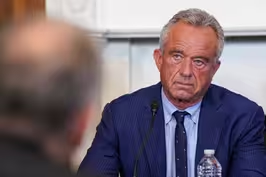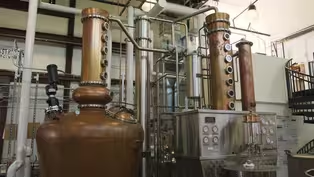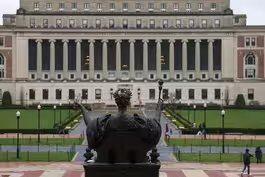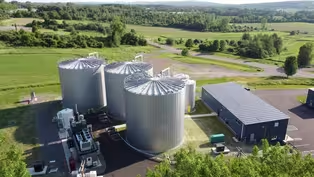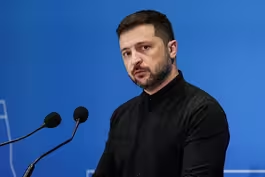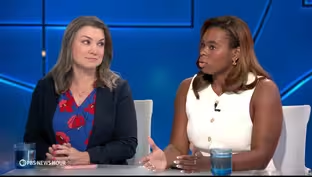
EU ambassador breaks down implications of U.S. trade deal
Clip: 7/28/2025 | 9m 7sVideo has Closed Captions
EU ambassador breaks down implications of U.S. trade deal: 'We know where we are going'
The announcement of the U.S.-European trade deal marks an important moment in President Trump’s larger battles over tariffs and trade. But it’s generating mixed reactions in Europe and in the U.S. Amna Nawaz discussed more with Jovita Neliupšienė, the European Union’s ambassador to the United States.
Problems playing video? | Closed Captioning Feedback
Problems playing video? | Closed Captioning Feedback
Major corporate funding for the PBS News Hour is provided by BDO, BNSF, Consumer Cellular, American Cruise Lines, and Raymond James. Funding for the PBS NewsHour Weekend is provided by...

EU ambassador breaks down implications of U.S. trade deal
Clip: 7/28/2025 | 9m 7sVideo has Closed Captions
The announcement of the U.S.-European trade deal marks an important moment in President Trump’s larger battles over tariffs and trade. But it’s generating mixed reactions in Europe and in the U.S. Amna Nawaz discussed more with Jovita Neliupšienė, the European Union’s ambassador to the United States.
Problems playing video? | Closed Captioning Feedback
How to Watch PBS News Hour
PBS News Hour is available to stream on pbs.org and the free PBS App, available on iPhone, Apple TV, Android TV, Android smartphones, Amazon Fire TV, Amazon Fire Tablet, Roku, Samsung Smart TV, and Vizio.
Providing Support for PBS.org
Learn Moreabout PBS online sponsorshipAMNA NAWAZ: The announcement of the U.S.-European trade deal marks an important moment in President Trump's larger battles over tariffs and trade, but it's generating mixed reactions in Europe and in the U.S.
While the details of the agreement have not been released, some key pieces are known.
E.U.
exports to the United States will face a tariff rate of 15 percent, including on cars, car parts, pharmaceuticals and semiconductors.
But the U.S. will keep tariffs on E.U.
steel and aluminum at 50 percent.
Some products, including aircraft, certain chemicals and semiconductors, will not have any tariffs.
And the E.U.
will invest $600 billion in the United States and buy $750 billion worth of oil, liquid natural gas and nuclear fuels during President Trump's term.
For more on the many questions around all of this, we turn to Jovita Neliupsiene, the European Union's ambassador to the United States.
Madam Ambassador, so good to have you here.
Welcome back.
JOVITA NELIUPSIENE, European Union Ambassador to the United States: Well, thank you for having me.
AMNA NAWAZ: So, most European products will now face this 15 percent tariff.
That is lower than the 30 percent that President Trump was threatening at one point.
But would you say this is a good deal for E.U.
businesses?
JOVITA NELIUPSIENE: Well, first of all, I think that what is extremely important to have a deal is predictability and that we know where we are going.
And now we can focus our job and, like, business can focus on the trade, on the investments, on the job-creating.
I would say that predictability and moving on, on strategic cooperation is the key element in this deal.
AMNA NAWAZ: So, it takes the uncertainty out of the equation, right?
But there are some who've looked at the contours, early contours, we should say, of the deal and described it as lopsided, unbalanced, asymmetrical in the United States' favor.
Do you agree with that assessment?
JOVITA NELIUPSIENE: Well, there is a changing environment in trade overall globally, and it was always the policy of the president, Trump.
E.U.
never was keen on having a tariffs.
We never use tariffs as our main policy tool in our toolkit.
But I do believe that predictability, stability is very important for the business.
Yes, it's a different reality from what was before.
We will face and our companies will face -- around 70 percent of our trade will face tariffs.
But we are working, still working to still finalizing the details of the list where we have zero for zero, so the tariffs will not be applied.
And, well, let's hope this $1.7 trillion of trade we are experiencing every year will remain here, because this actually creates 16 million jobs on both sides of Atlantic.
AMNA NAWAZ: The zero-for-zero tariffs could be something that applies to specific industries, is that what you're saying?
JOVITA NELIUPSIENE: Yes.
AMNA NAWAZ: You're not ready to say which ones just yet?
JOVITA NELIUPSIENE: I think that the president of the commission already mentioned some of them.
But still the work is in progress.
AMNA NAWAZ: I'm sure you have seen some of the reaction already coming into the deal.
I want to put to you what France's prime minister said online, writing: "It's a dark day when an alliance of free peoples united to uphold their values and defend their interests resigns itself to submission."
The Hungarian prime minister said -- quote -- "It's obvious to me this is not an agreement.
Donald Trump ate Ursula von der Leyen for breakfast."
That's the European Commission president.
"That is what happened."
Your reaction to those reactions and what's the bottom line here to avoid escalation?
JOVITA NELIUPSIENE: Look, every business I met personally here in the United States on both -- like, the businesses, American businesses, but as well as European businesses who has a massive presence here.
All the leaders in the European Council, the leaders were really for having a deal.
So we have a deal.
We have a predictability.
We have a stability.
And hopefully we know where we are heading.
As I said, tariffs was not really the choice of the E.U.
But I think that we have to measure ourselves from the point where we are right now.
So right now our car industry is facing 27.5 percent of the tariffs.
The steel and aluminum is at 50 percent.
So I think -- and there are several cases built on here in the United States, on chips, on engines, on aviation.
We don't know where those two -- three -- two investigations with land.
So I'm sure that having this clarity right now gives the business a bit of relief to see how they will go forward.
AMNA NAWAZ: Is it fair to say in the E.U.
's approach to this, it was not going to go back to the old way it was, so the goal was to mitigate whatever damage might be brought or however high the tariffs might go?
Is that fair?
JOVITA NELIUPSIENE: Well, I think that this was really what the president, Trump, was trying to do.
He wants to rebalance trade relations with his partners around the world globally.
We are among the biggest.
We're actually the biggest trading partner for the United States.
And I don't see this kind of going backwards.
We have to work and see, like, there are -- one thing is to deal with trade and how much we trade and what kind of the rules and basic tariffs, baseline tariffs that we have.
Another to see, are there common challenges which we have to approach and work together in order to make sure, for example, to protect ourselves from the overcapacity of non-market economies.
So there are other areas where we will have to cooperate as well and from now on AMNA NAWAZ: The $750 billion pledge to buy American energy from the E.U., we know that will be spread out over President Trump's remaining three years.
Where exactly will that be directed?
Has that been decided yet?
JOVITA NELIUPSIENE: Well, look, there are a lot of companies and governments who are already buying energy, energy resources.
So we were buying like really very limited back in 2022.
We already now, because of the -- Russia's aggression in Ukraine, we increased dramatically our purchases of the American LNG to spending $74 billion a year.
But on top of that, what is happening right now in the E.U., we're actually phasing out all Russian LNG refined oil and as well nuclear fuel.
And this is a huge opportunity for the United States to supply these needs, which E.U.
will need in the upcoming few years.
And I think that this is where actually the 750 comes in.
We need not only resources themselves, but we need a strategic security, a geopolitical security, which when you partner with the ally in this kind of the most important strategic sector, actually, which is brought with the supplies.
AMNA NAWAZ: I need to ask you briefly about the other major news we're covering on Israel's war in Gaza and the steps to address the starvation crisis there.
We know the E.U.
's view of this conflict.
France, as you know, has just announced that they're going to be joining other E.U.
member states to officially recognize Palestine.
Do you see these official recognitions helping in some way to work towards a two-state solution that the E.U.
has long backed?
JOVITA NELIUPSIENE: So recognition of one or another country is actually national competence.
So it's national governments of the member states will make those decisions and it will remain in their hands.
But I have to admit that E.U.
has a longstanding policy on Palestine.
We have already supported and provided humanitarian aid, which is at the level of $500 million.
It's at 17,000 children who are right now in that area.
We use the tools of humanitarian evacuation of their mostly injured people from there.
And our principals are really in the close contacts with Israeli ministers as well to make sure that the humanitarian corridors are open and we can provide as much support as possible.
AMNA NAWAZ: Does recognizing Palestine get you closer to a two-state solution, though?
Do you still believe that's possible?
JOVITA NELIUPSIENE: I think that whatever makes their people really help to solve the humanitarian crisis should remain on the agenda, in the hands of the member states.
AMNA NAWAZ: That is E.U.
's ambassador to the United States, Jovita Neliupsiene.
Madam Ambassador, thank you for your time.
JOVITA NELIUPSIENE: Thank you.
AMA president warns against preventive services panel cuts
Video has Closed Captions
Clip: 7/28/2025 | 6m 34s | AMA president warns against preventive services task force cuts (6m 34s)
Distillery blends local flavors to create unique spirits
Video has Closed Captions
Clip: 7/28/2025 | 4m 50s | Rhode Island distillery blends local flavors to create unique spirits (4m 50s)
Examining Trump's approach to combat antisemitism on campus
Video has Closed Captions
Clip: 7/28/2025 | 6m 19s | A look at 'Project Esther' and Trump's approach to combat antisemitism on campus (6m 19s)
How Ben & Jerry’s is recycling food waste into energy
Video has Closed Captions
Clip: 7/28/2025 | 7m 4s | How Ben & Jerry’s is recycling food waste into energy (7m 4s)
News Wrap: Trump moves up his deadline for Putin to end war
Video has Closed Captions
Clip: 7/28/2025 | 6m 49s | News Wrap: Trump moves up his deadline for Putin to end Ukraine war (6m 49s)
Tamara Keith and Jasmine Wright on Trump's trade deals
Video has Closed Captions
Clip: 7/28/2025 | 8m 32s | Tamara Keith and Jasmine Wright on Trump's trade deals and the economy (8m 32s)
Trump says he sees 'real starvation' in Gaza
Video has Closed Captions
Clip: 7/28/2025 | 3m 27s | Trump urges Israel to allow food into Gaza as he sees 'real starvation' there (3m 27s)
Providing Support for PBS.org
Learn Moreabout PBS online sponsorshipSupport for PBS provided by:
Major corporate funding for the PBS News Hour is provided by BDO, BNSF, Consumer Cellular, American Cruise Lines, and Raymond James. Funding for the PBS NewsHour Weekend is provided by...
